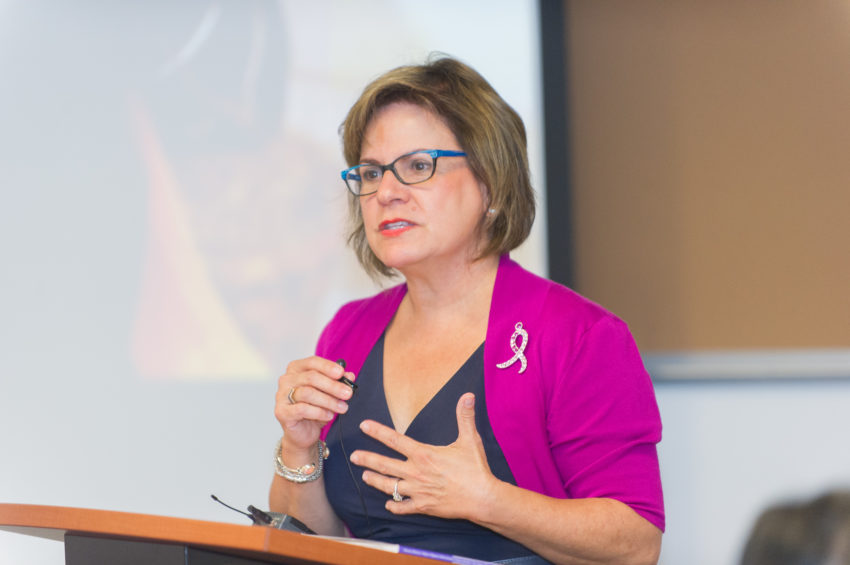
Share On Social!
Dr. Amelie G. Ramirez, a top cancer health disparities researcher and director of Salud America! at UT Health San Antonio, today was named one of 12 new “Komen Scholars” by Susan G. Komen, the world’s largest non-profit funder of breast cancer research.
Komen Scholars are an advisory group of distinguished leaders in breast cancer research and advocacy.
Each scholar—chosen for their knowledge, leadership, and contributions to breast cancer research—will help guide Komen’s $956 million research program, present at national meetings, and serve as experts and advocates for Komen’s nationwide network of affiliates and in communities around the globe.
Ramirez, as part of being named a Komen Scholar, will receive $600,000 over three years to study Latina breast cancer. She expects to beta-test her team’s new bilingual, culturally relevant phone app and patient navigation services to help local breast cancer patients stick with their prescribed therapy.
“I’m extremely thankful to Komen for this honor because it enables us to implement this app, which we believe will not only improve breast cancer survival rates and quality of life among local women, but also will provide a system that can be replicated for broad use among patients using oral anticancer agents in other areas, too” said Ramirez, who had previously served on Komen’s Scientific Advisory Board.
Ramirez’s Breast Cancer Research
Ramirez has more than 30 years of experience developing robust breast cancer health communication models, research interventions, and community outreach among the Latina population.
Her studies and programs have contributed to increased cancer screening, better cancer risk factor identification, and more culturally relevant communication about how healthy lifestyles can help prevent breast and other cancers. For example, her patient navigation studies reduced Latina breast cancer patients’ times to diagnosis and treatment, which helped save their lives. She also led the creation of a bilingual booklet to encourage Latina cancer survivors.
Ramirez also has led Salud America! since its founding in 2007.
Full Komen Scholar List
The other new Komen Scholars are:
- Wayne Dornan, Ph.D., Advocates in Science Steering Committee, Smyrna, TN (research advocacy)
- Reshma Jagsi, M.D., D.Phil., University of Michigan (radiation oncology, health outcomes, health care systems delivery
- Marian Johnson-Thompson, Ph.D., Advocates in Science Steering Committee, Durham, NC (co-survivor, research advocacy)
- Ingrid Mayer, M.D., M.Sci., Vanderbilt University Medical Center (oncology, clinical trials, novel therapeutics)
- Donald McDonnell, Ph.D., Duke University School of Medicine (cancer biology, endocrinology, novel therapeutics)
- Julie Palmer, Sci.D., MPH, Boston University (co-survivor, health disparities, epidemiology, breast cancer risk, risk reduction)
- Rebecca Seago-Coyle, MA, Advocates in Science Steering Committee, Rochester, WA (survivor, research advocacy)
- Sohrab Shah, Ph.D., Memorial Sloan Kettering Cancer Center (cancer genomics, computational biology, bioinformatics)
- Meryl Weinreb, MA, Advocates in Science Steering Committee, Landenberg, PA (survivor, research advocacy)
- Lisa Carey, M.D., UNC Lineberger Comprehensive Cancer Center (clinical research, molecular subtypes of breast cancer and treatment response)
- Sandy Finestone, Psy.D., a Komen Advocate in Science from Costa Mesa, CA (patient support and research advocacy).
“We are excited to welcome such an incredible, knowledgeable group to the Komen Scholars,” said Victoria Wolodzko, SVP, Mission at Komen. “Whether they bring experience from the laboratories, the clinic, or as patients themselves, these individuals are assets to our organization and to the work we are doing to achieve our Bold Goal of reducing the current number of breast cancer deaths in the U.S. by 50 percent by 2026.”
By The Numbers
25.1
percent
of Latinos remain without health insurance coverage



